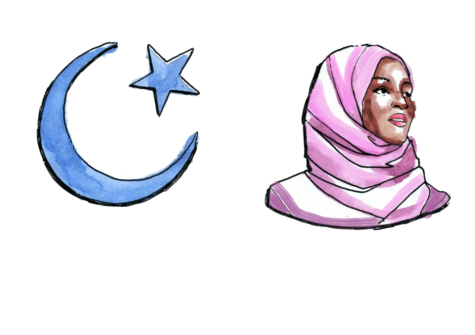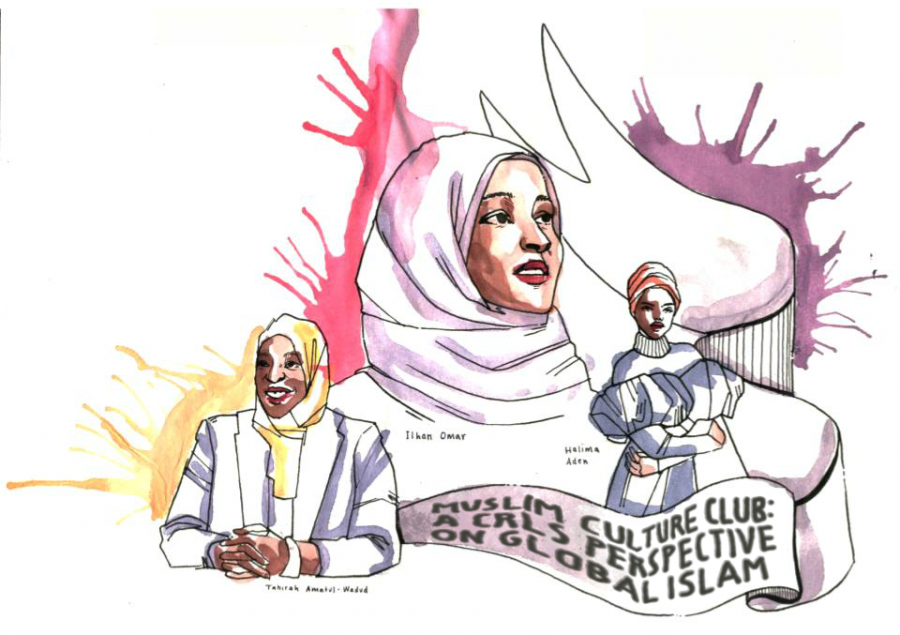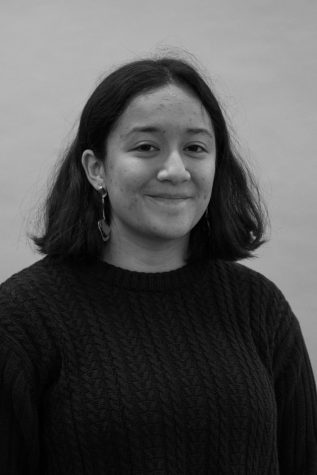Muslim Culture Club: A CRLS Perspective on Global Islam
Pictured: Three Muslim women who have worked to complicate stereotypes about Muslims.
March 5, 2020
The following pieces are part of the Register Forum’s new series of guest-written contributions from different CRLS clubs. The views expressed in these pieces do not represent the opinions of the Register Forum. They are the perspectives of the CRLS Muslim Culture Club.
Islam’s Global Diversity
In the Western world, Islamophobia runs rampant. Modern-day Islamophobia has primarily stemmed from the September 11, 2001 attacks on the World Trade Center in New York and is perpetuated every time a “Muslim”—or simply someone with an Arabic name—commits a crime, and people in the West make the generalization that all Muslims are criminals or terrorists. Although younger generations of both Muslims and non-Muslims in the US have learned to be more tolerant towards a variety of people, Islam is still a minority religion in the West and is criticized, generalized, and mocked, whether through everyday subtle bias in real life or the overt bigotry that people hiding behind screens display online. Islam is portrayed wrongly in many ways; people ignorantly assume that all Muslims are Arab or that our religion is oppressive or evil in some way.
Islam is the second-largest religion in the world, with over 1.8 billion adherents around the globe. Many may assume that Muslims are primarily Middle Eastern or North African, but actually over 60% of Muslims are from Asia, and Indonesia, Pakistan, and India have the three largest Muslim populations in the world. In fact, India and Pakistan combined have more Muslims than all countries in the Middle East and North Africa do. Islam is also the world’s fastest-growing religion, and this fact should be a cause for celebration as Islam is first and foremost a religion of peace and giving to others. Millions of people have converted, and many people practice in their own ways while ultimately building their own connection to our holy book the Qur’an and the Abrahamic God, Allah (SWT). SWT is an abbreviation of an Arabic phrase “Peace Be Upon Him” which is said after mentioning the Prophet’s name.
Black History & Islam
Islam is not limited to one race or one look. Many Muslim Culture Club members, as well as Black Student Union members at this school, are Muslim, of all different ethnicities and races, and all practice their religion in their own individual ways. The connections among race, ethnicity, religion, nationality, and culture are all aspects of identity that make up a person or a population and the overlaps between these elements are where solidarity in the fight for equality can be formed. Black history globally, especially African history, is parallel to Islamic history. It was not all peaceful—the gory colonial past must be acknowledged—but today, we see the outcome of history in the huge population of black Muslims worldwide. There are millions of black Muslims all over the continent of Africa and hundreds of thousands of African American converts to Islam. In fact, according to the Pew Research Center, American-born black people account for about 13% of the adult Muslim community. Also according to Pew, nearly all American-born black Muslims agree that there is an abundance of discrimination against Muslims in America, almost identical to the share who say there is an abundance of discrimination against black people in the US. Thus, to hold both of these aspects of identity, black and Muslim, in the United States can mean facing even greater disadvantages. Perhaps the best-known group of black Muslims in the US is the Nation of Islam, which claimed high-profile and impactful African American leaders such as Malcolm X and Muhammad Ali as members. Today, this subset makes up a small portion of black Muslims in the US, and all of the history is written in the books.

The True Heart of Islam
Since 9/11, the blatant othering of Muslims has peaked with the misportrayal of Islam’s peaceful followers as inhuman beings, terrorists, and murderers. While many Americans are aware of this misrepresentation, especially the well-informed students of CRLS, it is something that we do not often have conversations about. These perceptions have caused Muslims to become targets in their daily lives. From our names to our attire (such as the hijab) to the length of a man’s beard, many identity stereotypes contribute to assumptions people wrongfully make about Muslims. These assumptions have resulted in students being bullied for their choice of clothing, discrimination against Muslims in the workforce, unfair treatment and commentary even from communities that claim to be open-minded and liberal, getting special (and unwanted) extreme attention in American airports, and even women getting their hijabs ripped off.
As a club that welcomes all, we would like to use this opportunity to spread a few facts about Islam to the CRLS community, rather than let people make assumptions based on common lies and rumors about the religion. First and foremost, the Arabic word “Islam” means “submission.” Essentially, this means that our religion is based on submission to God’s word and will. God’s word is the Qur’an, our Holy Book that we believe was sent down to be received by Prophet Muhammad (Peace Be Upon Him) for all Muslims to take example from. Therefore, Islam means peace. Furthermore, it is written in the Qur’an that killing is forbidden for Muslims unless it is for the purpose of food. The cold-hearted people who commit evil actions are not following the religion’s ideologies—they are committing major sins that Islam preaches the complete opposite of. Lastly, Islam promotes charity heavily, especially during the month of Ramadan, when Muslims fast from dusk to dawn for thirty days. The month of Ramadan is a time where Muslims are able to improve their character, break bad habits, and become closer to God. Ramadan is about more than simply fasting and this aspect of Muslim culture is something that our club is actively seeking to educate the community about during our Ramadan/Eid event called “A Taste of Ramadan.” At this event, students and families are invited to learn about the month of Ramadan, play family-friendly games, and get their Henna done. At this event that we have held for two years now, we have invited Muslims and non-Muslims alike from the school and city communities. The main educational experience at the event is our presentation that highlights an overview of Islam and its tenets, the diversity of our club members, the rituals performed during Ramadan, and the true meaning of Ramadan to our religion: restraint and self-reflection.
Hijab & Empowerment
We interviewed both hijab-wearing and non-hijab-wearing Muslims and asked them two questions: “What is the hijab’s impact on you?” and “How would you respond to the portrayal in some areas of the world of the hijab being a veil of oppression?” Here are some of their responses:
“The hijab has definitely empowered me. It has given me identity. I feel like I am more respected with the hijab on, and I feel like I am able to maintain my boundaries and avoid the male gaze. I wasn’t forced to wear the hijab—my family wanted me to wear it in 6th grade, so I said yes. It was an expectation, but I wasn’t forced and I wasn’t against the decision. I did it with my own satisfaction. I feel like feminists might be against the hijab because of certain views, but to me, it’s not really oppressive, we are just trying to express our personalities as our identity, we want that to stand out rather than our beauty. We don’t want to be objectified, and we demand respect, and there’s a power to that.” – Sidrah Khan ’20
“I personally find myself agreeing with the statement that in some areas in the world the hijab is seen as a form of oppression, however, that’s not what the hijab truly stands for. From what I know and [have] read, the hijab acts as a mercy from God. In the Qur’an, modest covering of the head and body serves as a protection—the Arabic word hijab even roughly translates in English to ‘barrier.’ In terms of oppression, I believe that I lack the right to speak on behalf of the Muslim women in parts of the world where wearing the hijab is forced by law. I would ask them what meaning [and] purpose wearing a veil [has] to them [and] I would ask how they feel wearing it to gain a greater understanding on if it is truly being used as an instrument of oppression.“ – Ibrahim Ware, ‘20
“Wearing the hijab makes me feel different. I know there’s a lot of people that wear it, but everyone wears it for different reasons. It has had a huge impact on my identity because I have something in common with all the other hijabis, but ultimately it makes me feel closer to Allah which makes me proud. The hijab is a choice for women. Modesty is a huge part of Islam, and the hijab is a part of it. For the people that are ignornant to Islam and don’t know our morals, they view it as oppression because it is something they couldn’t see themselves doing. This is understandable, but they should leave it to Muslim women to decide for themselves.” – Alif Sheikh ’23
“I believe [the hijab] is portrayed as oppressive in many areas of the world. One case would be in Europe, where they don’t allow school girls to wear hijab nor permit Muslim mothers to pick up their children while wearing one. I actually witnessed this myself when I was studying in Paris, especially this one time when ‘the concept of hijab’ was brought up and some of my classmates—who you could say were white feminists—related it so much more to being oppressive and referred to it as an action that is forced on all Muslim women who wear it. They were disillusioned so much so that even if those Muslim women were to say the opposite, their opinions would be invalidated—as in the only time a woman would be considered free in her choice of clothing is when she fits their criteria of clothing (which is pretty much not covering up). Besides Europe, I definitely think it is portrayed as oppressive even within our own community, since I witnessed a white male classmate asking the question, ‘but isn’t hijab oppressive?’ during a conversation where hijab was brought up.” – Zineb Bouhi ’20
“I think in some areas in the world it is a problem, as women in certain countries are forced to wear a hijab. But in recent years, I think it’s occurring less and women are able to make their own decisions of not just the choice of the hijab but how they practice Islam in general. My personal opinion is it doesn’t matter whether or not you wear a hijab, but it should be your own decision whether you want to cover yourself. At the end of the day, it is how you practice the religion and your relationship with Allah, not someone who’s forcing you to do something.” – Fizza Ahmed ’20
This piece also appears in our February 2020 print edition.










